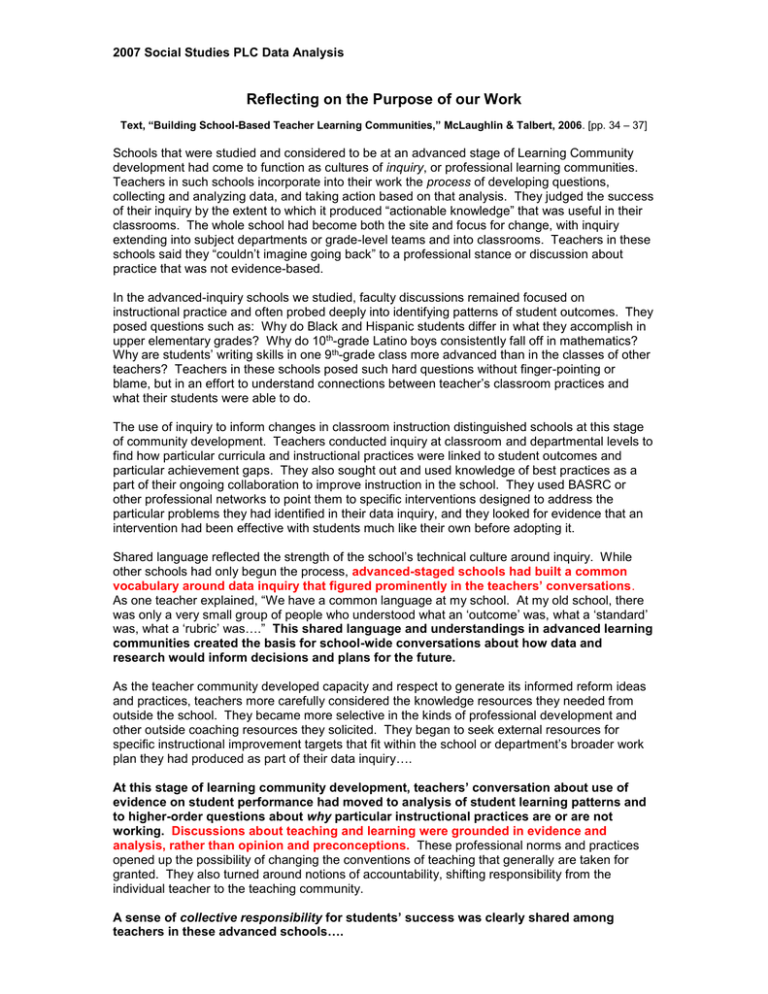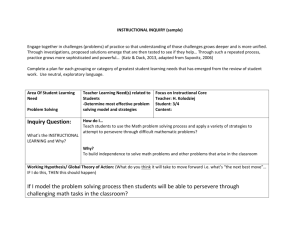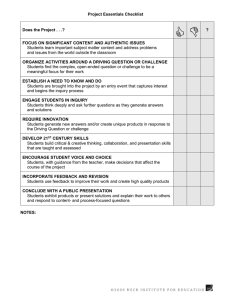Reflecting on our Work (excerpts from McLaughlin Talbert, Building School-Based Teacher Learning Communities )
advertisement

2007 Social Studies PLC Data Analysis Reflecting on the Purpose of our Work Text, “Building School-Based Teacher Learning Communities,” McLaughlin & Talbert, 2006. [pp. 34 – 37] Schools that were studied and considered to be at an advanced stage of Learning Community development had come to function as cultures of inquiry, or professional learning communities. Teachers in such schools incorporate into their work the process of developing questions, collecting and analyzing data, and taking action based on that analysis. They judged the success of their inquiry by the extent to which it produced “actionable knowledge” that was useful in their classrooms. The whole school had become both the site and focus for change, with inquiry extending into subject departments or grade-level teams and into classrooms. Teachers in these schools said they “couldn’t imagine going back” to a professional stance or discussion about practice that was not evidence-based. In the advanced-inquiry schools we studied, faculty discussions remained focused on instructional practice and often probed deeply into identifying patterns of student outcomes. They posed questions such as: Why do Black and Hispanic students differ in what they accomplish in upper elementary grades? Why do 10th-grade Latino boys consistently fall off in mathematics? Why are students’ writing skills in one 9th-grade class more advanced than in the classes of other teachers? Teachers in these schools posed such hard questions without finger-pointing or blame, but in an effort to understand connections between teacher’s classroom practices and what their students were able to do. The use of inquiry to inform changes in classroom instruction distinguished schools at this stage of community development. Teachers conducted inquiry at classroom and departmental levels to find how particular curricula and instructional practices were linked to student outcomes and particular achievement gaps. They also sought out and used knowledge of best practices as a part of their ongoing collaboration to improve instruction in the school. They used BASRC or other professional networks to point them to specific interventions designed to address the particular problems they had identified in their data inquiry, and they looked for evidence that an intervention had been effective with students much like their own before adopting it. Shared language reflected the strength of the school’s technical culture around inquiry. While other schools had only begun the process, advanced-staged schools had built a common vocabulary around data inquiry that figured prominently in the teachers’ conversations. As one teacher explained, “We have a common language at my school. At my old school, there was only a very small group of people who understood what an ‘outcome’ was, what a ‘standard’ was, what a ‘rubric’ was….” This shared language and understandings in advanced learning communities created the basis for school-wide conversations about how data and research would inform decisions and plans for the future. As the teacher community developed capacity and respect to generate its informed reform ideas and practices, teachers more carefully considered the knowledge resources they needed from outside the school. They became more selective in the kinds of professional development and other outside coaching resources they solicited. They began to seek external resources for specific instructional improvement targets that fit within the school or department’s broader work plan they had produced as part of their data inquiry…. At this stage of learning community development, teachers’ conversation about use of evidence on student performance had moved to analysis of student learning patterns and to higher-order questions about why particular instructional practices are or are not working. Discussions about teaching and learning were grounded in evidence and analysis, rather than opinion and preconceptions. These professional norms and practices opened up the possibility of changing the conventions of teaching that generally are taken for granted. They also turned around notions of accountability, shifting responsibility from the individual teacher to the teaching community. A sense of collective responsibility for students’ success was clearly shared among teachers in these advanced schools…. 2007 Social Studies PLC Data Analysis

